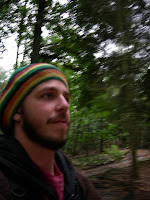 RE:VERB: ELEVEN / WEEP
RE:VERB: ELEVEN / WEEP
VAYIGASH
A weekly torah takeaway by Amichai Lau-Lavie
Join us for a year-long Jerusalem Journey, action by action, verb by verb. Each week I will pluck a verb from the Torah portion and set it reverberating both with its context and with my own. Let's make this a conversation, and talk our walk.
I sit down on a wooden bench, looking at the large black canvas and suddenly tears fill my eyes. For several minutes I can’t stop crying, head in hands, letting it all out. Perhaps had this been in NYC or Jerusalem somebody would have offered me a tissue (and advise), but this was London – the Tate Modern, and hundreds of people, mostly tourists like me, crowded the Mark Rothko Retrospective, politely ignoring a grown man weeping on a bench. Perfectly fine– the last thing I needed was to try and explain what was going on. Why was I weeping? A few deep breaths later I dry my eyes and scribble quick thoughts in the margins of the catalogue, trying to identify my strong emotional reaction to Rothko’s ‘Black Form Untitled No. 11’: “gradually, life dies into death, slowly, and there are no real separations, no borders, no shades, no death, no fear. I feel like I’m inside a tomb.”
The painting, from the artists’ later years, is a large square dominating the canvas – but unlike his more colorful palettes this one is all black. There is something hypnotic about it, like a vortex, or a long corridor of open doors. What first looks like a singular black surface becomes, as soon as I pause to really see it, a meditation on darkness: deep and deeper black, blurred, bottomless boundaries. A quote by Rothko greets visitors as they enter the exhibit hall:” If people want sacred experiences they will find them here. If they want profane experiences they will have them too. I take no sides.” I was surprised by my own reaction to the power of the art – it did feel sacred. And it felt good to cry, release some of the sadness I’ve been walking with all day, and to push my own boundaries of what’s ok or not ok to do. (I cry easily, truth be told, but real loud sobs, alone, in the middle of this big crowded gallery?)
I’ve been thinking about boundaries and borders all day – traveling from NYC back to Jerusalem – with a 24 hour stopover in London to visit family and indulge in ‘speed culture’ -- ‘Babylon’ exhibit at the British Museum, Rothko at the Tate, Turandot at the Royal Opera House. In between, walking alone along the freezing, familiar streets of London, I am in total transit: traveling between different homes, loved ones, obligations, languages, currencies, cell phone numbers - boundaries blur in ways both comforting and utterly confusing. And, all along my walking - newspaper stands with updated bulletin boards - other borders violently dissolving: ‘Israel vows to fight to the bitter end’ is one headline, ‘Gaza Doom’ is another. When I weep, courtesy of Rothko, it’s all of that combined: A weeping that makes no sense but helps to release the tension, if only for a moment. But is it really helpful? What comes after weeping?
After I leave the Tate and walk along the Thames River I am reminded of another moment of weeping - happening in this week’s Torah Tale ‘VaYigash’. The aftermath of THAT cry is of historical proportions – dissolving geographical and emotional borders, and opening tangible new possibilities for redemption and hope.
Joseph weeps– and though he has cried a few times in these Genesis chapters that describe his re-encounter with his siblings, the really big weeping erupts when he ‘comes out’ to them, revealing his true identity: Joseph’s cry is mythic – instantly reverberating throughout the land: “And he wept aloud; and the Egyptians heard, and the house of Pharaoh heard” (Genesis, 45: 2)
After the weeping come the stunned silence, and then - the gradual reconciliation, awkward words, embraces, kisses. Then there’s the reunion between Jacob & Joseph, as the aged Patriarch and his entire household evacuate the famine stricken homeland, leaving starvation behind for the abundance of Egypt. Joseph’s weeping opens the doors to truth and forgiveness– and also to the pantry of human survival.
The borders between Israel, Gaza and Egypt are wide open again, bleeding like open wounds – and the famine is back, and is real, as is the despair and anger and great weeping. Rockets defy borders, rage denies agreements, this ongoing pain is blurring away the dream that brothers and sisters, Abraham’s children, can co exist in peace.
But if there’s anything to learn from Joseph’s surreal saga it is the reminder that everything changes, and that dreams do come true. The man who was betrayed by his own brothers will be the one to offer them life. The grief of a bereaved parent will become but a memory, and a family torn by torment once again reunited. Joseph weeps and the world is shattered, and is changed. How much weeping, and by whom – can change the reality in the Middle East of today?
In the Tate gift shop I find a postcard of ‘Untitled No. 11’ and also a pin that says ‘Peace begins with a smile’. I smile to the cashier, wish her a peaceful and happy new year and head out to the cold, and I go home.









